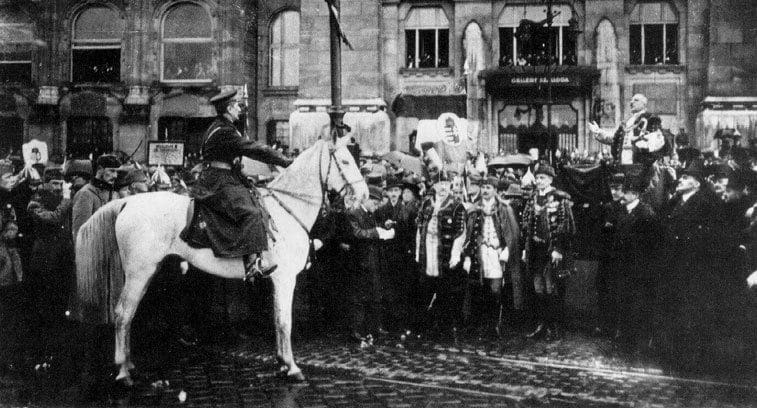In contemporary sources, Miklós Horthy, regent of Hungary between 1919 and 1944, was commonly depicted as an old, senile, impressionable puppet with minimal political acumen. While most historians have subscribed to this evaluation, Mária Ormos was a refreshing exception. The renowned Hungarian historian stated in 1998 that Horthy was not a stupid soldier at all, but rather an instinctive politician.[i] Ormos pointed out that for instance, Horthy had consciously marched his forces to Siófok in 1919, because there was neither Romanian nor communist resistance there, which means he was not looking for military confrontation, but was thinking like a politician. It does not seem to be an exaggeration to state that Horthy was more successful as a politician than as a soldier, as he rose to the highest position attainable in his civilian career.
The governor also skilfully manipulated public opinion. On occasion, he spoke about the importance of the ‘betterment of the race’, but at other times he would receive the leaders of the Jewish community. ‘Two steps forward, one step back,’ went the insightful description of Horthy’s rhetoric by the racialist Lehel Kádár, who was dissatisfied with the way in which the governor sometimes made gestures to big capital and Jews, and other times to defenders of the race.[ii] His triumphant march on Budapest on the back of a white horse (which suggested ‘liberation’ and ‘salvation’) testified to a very deep understanding of people being drawn to strong leaders. As Friedrich A. Hayek remarked, people would often rather have a despot of their own kind than a foreign liberal government.[iii] On one occasion, the governor explained the deterioration of the value of the Hungarian crown citing the antisemitic pamphlet The Protocols of the Elders of Zion—he clearly liked to play to ordinary people’s fears of modernity and capitalist development. This indicates that Horthy was an expert user of a two-faced rhetoric—a skilful politician, but hardly a good person.[iv]
In light of the above, the sources that characterised Horthy as a person with weak abilities must be re-examined. There is no point in further analysing the many domestic memoirs and diaries of the time that reflect resentment towards Horthy, such as the recollections of Pál Prónay, Miklós Kozma or István Zadrevecz. Suffice it to say that the authors who had been offended by the regent in some way described him as a stupid, manipulable person. Instead, we can examine the Western envoys’ reports if we are looking for independent sources. At first sight, these reports also underpin the presumption that Horthy had modest intellectual abilities. British diplomat Wilfrid Athelstan-Johnson came to the conclusion after talking with Horthy at his estate in Gödöllő that the regent was ‘clumsy and stupid’, but ‘a gentleman’. From the same period, one could cite the reports of the American mission, in which the diplomats negotiating with him described Horthy as a ‘lovable’ and ‘honest’ person, but also as a ‘not very capable’ and ‘quite stupid’ politician.[v]
To US chief of mission Grant-Smith, Horthy declared that ‘there is no such thing as “white terror” here’
At first glance, the above-cited sources point in the same direction in terms of opinions about Horthy, but even more interesting details can be read in the ambassadors’ reports. He was able to convince some of his interlocutors that he regularly read socialist papers and that he was a great friend of the free press and the West. He convinced others that he was not antisemitic and did not care who was of Jewish descent. To US chief of mission Grant-Smith, Horthy declared that ‘there is no such thing as “white terror” here.’ In his response, the American diplomat accepted that, according to Horthy, there really were no atrocities.[vi] Hans Cnobloch, the Austrian ambassador in Budapest, stated in his report drafted at the beginning of 1922 (!) that Horthy was ‘honest’ when he said that he had nothing to do with the 1921 uprising in Western Hungary that deprived Austria of certain lands rewarded to them by the treaty of Trianon. Cnobloch described the governor as a weak politician who could not act against the far-right detachments who started the uprising.[vii] Athelstan-Johnson noted that in his conversations with Horthy, ‘I couldn’t help but notice how often the governor uses the word “honour.” Hungary signed the [Trianon] treaty, so it has an honourable duty to ratify it, but will the Allies treat Hungary honourably? […] I felt that the facts could not be presented to him as business propositions, but that I was talking to a man who puts things at a higher level than is possible in practical politics.’ The British diplomat left Horthy’s company worried: ‘However strong a floater he is, the question remains: won’t the waves of the struggle which beat the outwardly unbreakable walls of his fort undermine him?’[viii] Cnobloch expressed similarly concerned lines regarding Horthy’s future.
In summary: the governor who, according to secondary sources, personally ordered the murder of the editors of the socialist daily Népszava, and whose pardon in 1921 led to the termination of the investigation into the murder; who explicitly stated in his private correspondence that he was antisemitic; and who personally participated in the violation of the Treaty of Trianon, apparently managed to convince his interlocutors that he had nothing to do with the white terror, that he read Socialist newspapers, that he was not antisemitic, and that he ‘earnestly’ abided by the terms of the peace treaty. Moreover, the ambassadors he tricked—professional diplomats with whom he conversed in a foreign language—were even worried about him!
The picture of Horthy that emerges from the contemporary reports of Western ambassadors is hardly that of a gullible politician, but rather of a shrewd, albeit immoral manipulator.
[i] Ormos Mária, ’Magyarország a két világháború korában, 1914–1945’. Budapest, Csokonai, 1998, 67.
[ii] Found among the personal papers of István Lendvai.
[iii] Friedrich A. Hayek, The Constitution of Liberty, London–New York, Routledge, 2006, xii.
[iv] László Szűcs, ’Osztrák diplomaták jelentései’, História, 1990/5–6. 22.
[v] National Archives (Kew, herein cited as NA), FO 371/6141.
[vi] Zsuzsa L. Nagy, ’Amerikai diplomaták Horthy Miklósról, 1920–1944’, Történelmi Szemle, 1990/3–4. 177.
[vii] Szűcs, ’Osztrák diplomaták jelentései’, 22.
[viii] NA, FO 371/4855.








